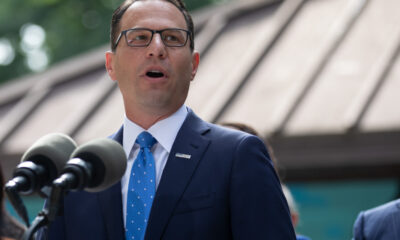Executive
A Positive Energy Agenda for America
America needs a positive energy agenda, one that emphasizes more energy rather than less, and promotes sound engineering.

America needs a political vision for energy policies that consider the costs of energy for all members of society, rich and poor alike. Americans deserve reliable, affordable energy technologies that let them maintain their standard of living and reduce their impact on the environment. Federal energy policies have become so preoccupied with responding to predictions of doom that they neglect the nation’s current energy infrastructure and ignore present environmental threats. To avoid catastrophe, people are expected to embrace an idealized energy system of the future without concerns for its actual performance or its costs.
From a negative energy agenda…
Instead, a national energy agenda must recognize the role of government primarily as a protector of individual rights, rather than as a proactive agent attempting to secure collective desired outcomes. Across the board, Americans consider it their right to have a clean environment just as they expect access to affordable and reliable energy.
The experience of Northern Europe with renewable energy over the last decades, complete with its aggressive intervention in markets and lopsided support for specific technologies, is instructive. After more than a decade of heavy-handed government intervention and massive subsidies, wind and solar have proven to be a poor investment. They have added to, rather than substituted for, physical energy infrastructure in Europe. Citizens in those countries that have invested most heavily in green energy pay the highest prices for energy and have seen their industrial base erode. The costs of green energy borne by the poor continue to fuel political populism in Europe and America.
… to a positive energy agenda
A positive national energy agenda aims to improve the productivity of American energy resources in providing useful energy to end users with reduced environmental impacts. The rise of natural gas to replace coal for electricity generation has delivered direct benefits to both American producers and consumers, and substantially improved America’s primary energy productivity. Today, combined cycle natural gas plants can convert upwards of 60% of the energy in natural gas to electricity, as compared to under 40% for coal.
America’s shift from coal to natural gas in the last decades, not wind or solar power, has been primarily responsible for reducing national carbon emissions for electricity by 40% between 2007 and 2022 according to the U.S. Energy Information Administration. The shift has also eased environmental pressures from ash piles to toxic metals pollution. Integral to continuing this trend of rising energy productivity are federal policies that extend the capacity and reach of the nation’s natural gas pipeline network, particularly in the heavily populated Northeastern section of the country, which suffers from energy scarcity despite abundant nearby energy resources.
Role of nuclear power – and hybrid vehicles
A positive national energy agenda must also feature more nuclear power. Nuclear technologies offer a singular promise of safe, reliable power without any carbon pollution. The federal government can remove barriers to developing and licensing new nuclear technologies for power generation. Federal regulations of the nuclear industry have grown steadily in the years since the industry’s inception, and their accumulated effect has been to sharply increase construction costs for nuclear reactors. To take just one example, current nuclear construction standards rely on a scientifically unsupported model that requires the shielding of nuclear containment vessels to levels below natural background radiation, unnecessarily adding significant costs for steel and concrete. To lower future costs for nuclear generation without threatening public safety standards, the federal government should continue to support next generation reactors and institute regulatory reform for the nuclear industry.
For the transportation sector, the fully electric vehicles now being mandated and subsidized aggressively by the federal government come with onerous demands for materials and infrastructure. By contrast, policies promoting the spread of hybrid vehicle technology would enhance energy productivity in the transportation sector. These vehicles use hydrocarbons more sparingly and require a much smaller volume of battery material per vehicle. Hybrids also have the advantage of onboard rechargeability for their batteries and would not require a national network of charging stations. Finally, hybrids face less of a barrier in appealing to consumers familiar with traditional vehicles. Integrating hybrids into the American auto fleet would improve its overall energy productivity.
Run the numbers!
A positive national energy agenda invites the examination of energy technologies using standard engineering principles and accurate estimates of the future need for governmental support. When subjected to such scrutiny, technologies such as Carbon, Capture, and Sequestration (CCS), grid-scale battery storage, and countless others would hardly draw the same support given the existing state of technology development. These technologies are deemed necessary in the context of a “climate emergency.” A critical review of these technologies would reveal that they require an enormous buildup of pipeline networks, storage facilities, mining activity, manufacturing and other industrial infrastructure. Even as the Earth’s climate is changing, the role of these technologies in influencing that change is not obvious or evident.
Finally, instead of fear, a positive national energy agenda must be based on hope for the future. In exchange for the false certainty about a climate calamity, plans for the future should focus on improving the lives of all Americans. The prospect of a better, cleaner American energy system inspires confidence in the country’s future economic foundations, giving hope to the young that the world of tomorrow is not destined to end in a catastrophe that we must scramble to avoid. That hope is essential to the future of the republic, as a belief in the future is at the center of any healthy society.
This article was originally published by RealClearEnergy and made available via RealClearWire.
Iddo Wernick is at the National Center for Energy Analytics.
-

 Civilization3 days ago
Civilization3 days agoWhy Europe Shouldn’t Be Upset at Trump’s Venezuelan Actions
-

 Executive4 days ago
Executive4 days agoHow Relaxed COVID-Era Rules Fueled Minnesota’s Biggest Scam
-

 Constitution5 days ago
Constitution5 days agoTrump, Canada, and the Constitutional Problem Beneath the Bridge
-

 Christianity Today3 days ago
Christianity Today3 days agoSurprising Revival: Gen Z Men & Highly Educated Lead Return to Religion
-

 Civilization4 days ago
Civilization4 days agoThe End of Purple States and Competitive Districts
-

 Executive3 days ago
Executive3 days agoWaste of the Day: Can You Hear Me Now?
-

 Executive4 days ago
Executive4 days agoWaste of the Day: States Spent Welfare in “Crazy Ways”
-

 Guest Columns5 days ago
Guest Columns5 days agoWhy We Need Lent














